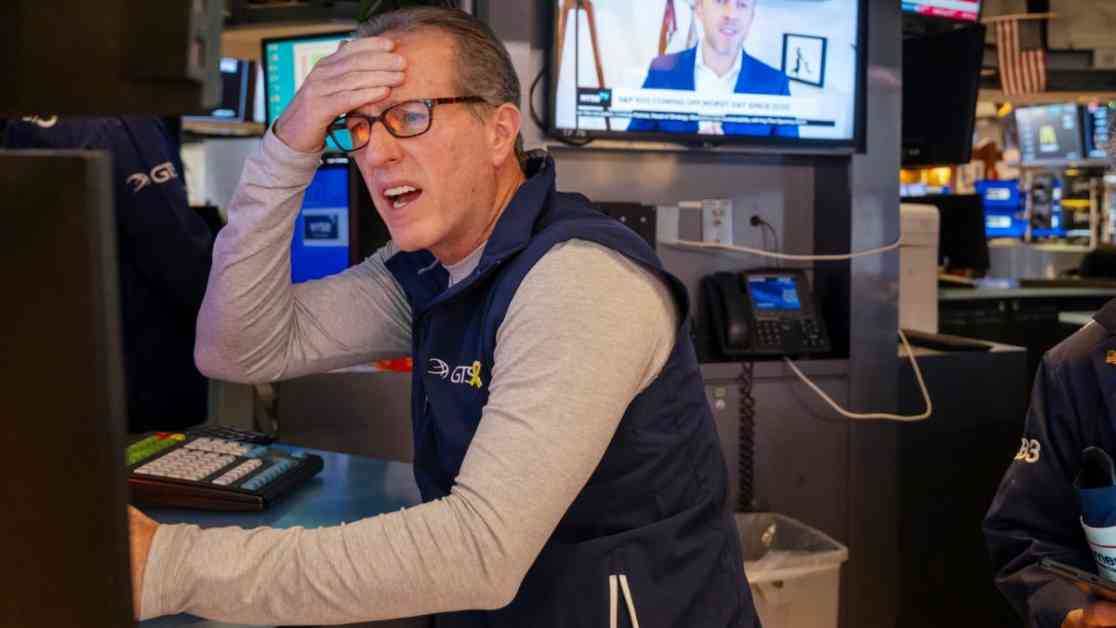Stock Market Plummet: Global Trade War Fears Cause Dow to Drop 1,200 Points
The stock market experienced a significant downturn on Friday, fueled by China’s announcement of new tariffs on U.S. goods, intensifying concerns about a potential trade war that could trigger a global recession. The Dow Jones Industrial Average plummeted by over 1,200 points, marking a 3% decline following a 1,679.39 point drop the day before. The S&P 500 also slid by 3.6%, in addition to a 4.84% decline on Thursday, while the Nasdaq Composite saw a 3.8% decrease after a 6% tumble the previous day. These sharp declines signal increased unease among investors regarding the escalating trade tensions between the U.S. and China.
China’s commerce ministry announced on Friday that the country would be imposing a 34% levy on all U.S. products. This move mirrored the tariff rates set by the U.S. on Chinese goods, as declared by President Donald Trump earlier in the week. The retaliatory tariffs from China had a significant impact on technology stocks, with industry giants like Apple, Nvidia, and Tesla experiencing substantial losses. Apple shares fell by over 3%, contributing to a 10% decline for the week, while Nvidia and Tesla saw 5% and 6% drops, respectively. These companies, heavily reliant on the Chinese market, bore the brunt of Beijing’s retaliatory measures.
Noteworthy mentions were Boeing and Caterpillar, key exporters to China, which led the Dow lower amidst the market turmoil. Michael Arone, SPDR chief investment strategist at State Street Global Advisors, expressed concerns over the situation, stating, “The Trump administration may be playing a game of chicken with trading partners, but market participants aren’t willing to wait around for the results.” This sentiment captures the prevailing apprehension among investors as they grapple with the uncertainty surrounding the trade dispute.
China’s response was not limited to imposing tariffs but also extended to other punitive measures, including adding companies to its “unreliable entities list,” highlighting alleged breaches of market regulations. Additionally, an antitrust investigation was launched into DuPont, leading to a 12% decline in the company’s shares. The growing tension between the two economic powerhouses has reverberated throughout global markets, prompting a flight to safety assets such as bonds, which caused a significant drop in the 10-year Treasury yield below 4%.
The imposition of tariffs and retaliatory measures by both the U.S. and China has fueled concerns about the potential onset of a global recession. President Trump’s unwavering stance on tariffs, despite the adverse market reactions, has heightened anxieties among investors. The Nasdaq Composite bore the brunt of the trade war, posting a 7.8% decline for the week, while the S&P 500 and Dow Industrials recorded 6.4% and 5.3% decreases, respectively. These developments have set the stage for a tumultuous period ahead in the financial markets.
Expert Insights: Impact of Tariffs on Global Economy
The escalating trade tensions and tit-for-tat tariff announcements between the U.S. and China have raised concerns about the broader economic implications. Peter Boockvar, chief investment officer of Bleakley Financial Group, warned about the potential repercussions, emphasizing that “the economy can dramatically raise the odds of a recession” if upper-income consumer spending is negatively affected. The delicate balance between stock market performance and economic growth is now in jeopardy, adding another layer of complexity to the unfolding trade war scenario.
Amidst the uncertainty, JPMorgan’s chief economist, Bruce Kasman, revised the odds of a global recession to 60% following the tariff announcements. This significant increase from the previous estimate of 40% underscores the severity of the situation, with potential ramifications for both the U.S. and global economies. The implications of sustained trade policies could lead to recessionary conditions, posing a significant challenge for policymakers and market participants alike.
As investors grapple with the fallout from the trade war, the stock market remains highly volatile, with the VIX spiking to its highest level since August 2024. The fear gauge reflects the prevailing uncertainty and risk aversion among investors, shaping the current market sentiment. The future trajectory of the trade dispute and its impact on global markets will be closely monitored in the coming days and weeks, as stakeholders navigate the turbulent waters of international trade relations.
Consumer Staples and Utilities: Safe Havens Amid Market Turmoil
Consumer staples and utilities have emerged as safe havens amidst the market turmoil, offering stability and resilience during periods of heightened volatility. These defensive sectors have seen positive performance, with staples up by 2.4% and utilities on track for a 1.2% advance. Companies like Lamb Weston, Dollar General, Exelon Corporation, and Duke Energy have weathered the storm, providing investors with a sense of security amid the market turbulence.
The market landscape continues to evolve rapidly, with shifting dynamics and escalating tensions reshaping investor sentiment. The interplay between trade policy, economic indicators, and market performance underscores the intricacies of global trade relations and their far-reaching consequences. As stakeholders navigate the uncertain terrain ahead, the resilience of consumer staples and utilities offers a beacon of stability in an otherwise volatile environment, providing a sense of reassurance amidst the prevailing uncertainty.














